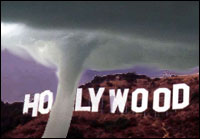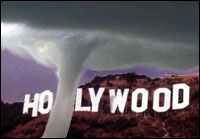It’s always been hard to get people to take global warming seriously because it happens too slowly. Not slowly in geological terms — by century’s end, according to the consensus scientific prediction, we’ll have made the planet warmer than it’s been in tens of millions of years. But slowly in NBC Nightly News terms. From day to day, it’s hard to discern the catastrophe, so we don’t get around to really worrying. Something else — the battle for Fallujah, the presidential election, the spread of SARS, the Jacksonian mammary — is always more immediate, and evolution seems to have engineered us for a fascination with the sudden.

Hollywood ending?
Slowness, by all accounts, shouldn’t be a problem with The Day After Tomorrow, a new global-warming epic due in theaters May 28. Apparently, the script posits that rapid melting of Arctic ice is enough to trigger massive changes in ocean currents, shutting down the Gulf Stream and setting off a humongous super storm. (It’s a premise that seems borrowed from late-night radio host Art Bell’s book The Coming Global Superstorm.) In the 20th Century Fox version, tornadoes rip through Los Angeles (targeting — what else? — the Hollywood sign), while a massive snowstorm pounds a puzzled New Delhi, and grapefruit-size hail batters Tokyo. The worst is saved for New York (which has already been wrecked by the film’s director, Roland Emmerich, in both Independence Day and Godzilla). A giant wave or two batters Wall Street, and then a day that began in sweltering heat turns unimaginably frigid; soon, the whole city is locked in a glacier.
So should environmentalists be cheering the news that Hollywood has finally managed a green epic? Many are. Al Gore will speak at a special MoveOn.org premier of the film. Jurgen Trittin, the German environment minister, lambasted the Bush administration last week for its failure to ratify the Kyoto treaty, saying, “[Our] challenge is that the reality of The Day After Tomorrow should not become reality.” Plenty of political commentators predict the film will drive home an election-year message that the Bush administration has been ignoring a crisis.
The underlying science is not nonsense. Arctic ice is melting, and quickly, thereby sending a pulse of fresh water into the North Atlantic. Some computer models indicate that this could weaken the Gulf Stream, bringing on regional cooling in Western Europe and the northeastern U.S. even as the rest of the planet warms. Meanwhile, extreme weather events are escalating: African floods, European windstorms, Asian droughts, and so on. All of these bad things won’t happen in one day, but the scenario is not pure Hollywood contrivance, either.

Climate change bites.
Photo: CDC.
There’s a chance, however, that the film’s depiction will set the bar too high. That is, if the reason we’re supposed to worry about global warming is that it will first send a tidal wave over the Statue of Liberty and then lock it forever in an ice cube, anything less will seem … not so bad. When, in fact, the more likely horror stories happen a little more slowly — and a little farther away from the Hollywood hills and the Manhattan canyons. For instance: The World Health Organization estimates that the spread of mosquitoes in a warmer, wetter world will cause malaria and dengue fever to explode. The deaths won’t come all at the same time, and they won’t involve people who look like Dennis Quaid, but they’ll be plenty real. And consider the latest statistics from the Earth Policy Institute, which note steep rises in grain prices as a direct result of harvests lowered by massive heat waves in the last few years — again, results that are less sensational but likely to be equally tragic.
Some of the first campaigners against genetically modified foods staked their case on the chance that something truly shocking would result from the new crop strains — some Frankenfood would poison or sterilize or mutate us all. But if that’s all the worry Monsanto has to address, then it’s probably home free. Now campaigners are recognizing that the real issues center on the subtler damage GMOs will do to ecologies and even more to economies, as they push small farmers off their land and benefit agribusiness. Likewise, Exxon — and George W. Bush — shouldn’t be able to claim the lack of glaciers on Chambers Street as proof that their opponents are just scaremongers.
It’s a hard line to draw. The story of global warming, the largest story of our time, needs dramatizing. (And a production company that spends $125 million making a movie needs a toppling skyscraper or two to draw the crowds.) But global warming isn’t like nuclear war. The Day After, the Reagan-era portrayal of an atom bomb dropped on Kansas City, worked precisely because a nuclear explosion would be instant and horrifying. Global warming is even more likely to be the end of the world as we know it — but a somewhat slower, soggier end. We may need a different lens to see it.


